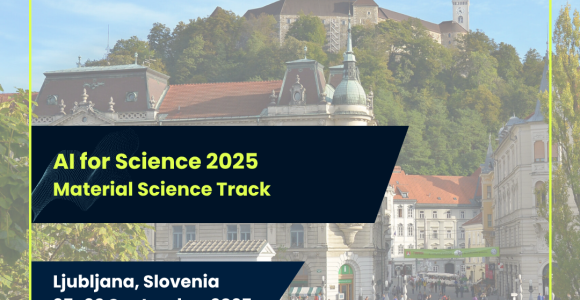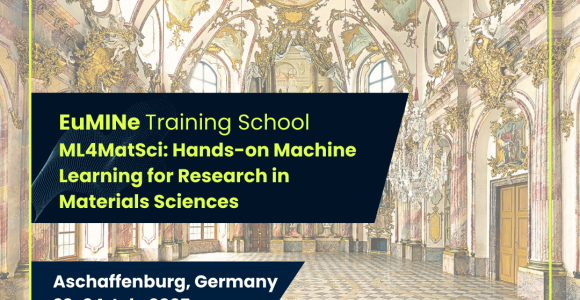AI & Material Science – 25-26 September 2025 (Ljubljana, Slovenia)
We are pleased to invite you to submit an abstract to the AI for Materials track, taking place in Ljubljana from September 25 to 26, 2025. The event is co-organized by the “European Materials Informatics Network” and the “Data-driven Applications towards the Engineering of functional Materials: an Open Network”, under the auspices of the European Cooperation in Science and Technology funding organisation.
Our event aims to bring together scientists, innovators, start-ups, and industry leaders to explore the state of the art and latest breakthroughs in artificial intelligence for materials discovery. Discussions will focus on identifying current limitations, overcoming bottlenecks, and fostering an open, synergic ecosystem for AI-driven materials research in Europe – where academia, large enterprises, start-ups, and scale-ups thrive together.
The EUMINE COST Action CA22143 and DAEMON COST Action CA22154 act as a co-organizer of the event. COST (European Cooperation in Science and Technology) is a funding agency for research and innovation networks. Our Actions help connect research initiatives across Europe and enable scientists to grow their ideas by sharing them with their peers. This boosts their research, career and innovation.
📝 Important dates
- 15. 7. 2025 – Paper/abstract submission deadline
- 21. 7. 2025 – Notification of acceptance
- 25. 7. 2025 – Camera-ready version and Author registration deadline
👉 Submission link
Conference Topics:
- Materials discovery: automated computational and experimental workflows
- Materials modeling: fast and accurate simulations
- Retrosynthesis discovery: LLMs and agentic-AI
- Process-Structure-Property relationship discovery
- Materials informatics: from material discovery to market
Submission Guidelines
Abstracts must be submitted using the Springer LNCS template. Both LaTeX and Word versions are available.
Abstracts will be included in the conference proceedings
Length: 1–2 pages (including references), formatted in LNCS style.
All submissions should include: Title, Authors, Affiliations, Keywords, Main text, and References.
Title: Concise and informative.
Authors and Affiliations: Full names and institutional affiliations.
Keywords: 3–5 relevant terms (e.g., deep learning, materials discovery)
Main Text:
- Intro/Motivation: Brief context on the materials challenge.
- Method: Brief description of the AI technique(s) adopted.
- Results: Key findings or objectives, ideall with one figureConclusion/Future Work: Final remarks or outlook.
Program Chairs
- Francesco Mercuri (CNR Bologna)
- Kevin Rossi (TU Delft)
For more information visit the conference website


